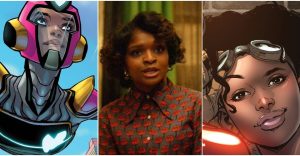Doom Patrol Season 3 Is All The Real Eternal Flagellation – Theory Explained

Warning: Contains spoilers for Doom Patrol season 3 episode 9.
The Eternal Flagellation in Doom Patrol season 3 is advertised as an artistic expression to make people confront who they really are and become better people, but there are hints that the real Eternal Flagellation is a more meta experience. The Sisterhood of Dada’s plan has been a major focus for season 3 with it being pushed heavily in the Doom Patrol trailer. However, the Eternal Flagellation is not actually mentioned until Doom Patrol season 3, episode 5 “Dada Patrol.”
When Laura De Mille (Michelle Gomez) first brings up the Sisterhood of Dada and their plan for the Eternal Flagellation, she sends the Doom Patrol on a mission to find out more but they aren’t very successful. The Eternal Flagellation is started at the end of Doom Patrol season 3, episode 7 “Bird Patrol,” when Rita Farr (April Bowlby) unleashes it, but seems to have ended after the Doom Patrol confront their subconscious selves by the end of season 3, episode 8 “Subconscious Patrol.” Rita does her best to explain the Eternal Flagellation as an exercise where people confront and admit their secrets and traumas and, by no longer keeping them bottled inside, become better people. However, this idea is challenged by the fact that, for Rita, it might be more about getting revenge on Laura De Mille, AKA Madame Rouge.
While it seems like the entirety of the Sisterhood of Dada’s Eternal Flagellation might be over within a single episode, there are suggestions that it could be something a lot larger. The Eternal Flagellation could actually be the entirety of Doom Patrol season 3 and be targeted not just at the Doom Patrol but at the audience as well. Here are the hints to this being the intended interpretation and how this meta version of the Eternal Flagellation would work.
The Eternal Flagellation Of The Doom Patrol

The very name of the Sisterhood of Dada’s plan suggests that it should not be over after a single episode that portrays a series of discrete events. While the limits of TV might cause problems for Doom Patrol portraying a flagellation that was truly “eternal,” it seems unlikely that the Sisterhood of Dada’s Eternal Flagellation would be over at the conclusion of season 3, episode 8. However, even Sachiko (Gina Hiraizumi) notes at the end of season 3, episode 7, that these events are only the prologue and part of a larger plan to see the people of Earth, and the Doom Patrol and Laura De Mille in particular, perform their own flagellations in which they effectively beat themselves in a drive for self-improvement and purification.
While the Doom Patrol have all had their flaws acknowledged and slowly worked on in Doom Patrol seasons 1 and 2, the characters have consistently tried to avoid actually confronting these issues. Season 3 has seen a dramatic change in that with Larry Trainor (Matthew Zuk/Matt Bomer) finally standing up to his son, Robotman (Riley Shanahan/Brendan Fraser) being pushed to finally seek proper medical help, Vic Stone (Jovian Wade) reconsidering what it means to be Cyborg in a more concrete way, Jane (Diane Guerrero) accepting Kay Challis’ (Skye Roberts) growth and independence, and Rita acknowledging her past traumas and working to become better.
While season 3 episode 8 shows a more literal confrontation between these characters and their secrets and traumas during Rita’s defined Eternal Flagellation, they have been working on these problems for the whole of the season. These issues are also not completely resolved when the episode and the experience Rita claims is the Eternal Flagellation end. All of this suggests that the Eternal Flagellation is actually a more meta concept through which the entire season from beginning to end could be viewed, and is not simply the plan that is seen enacted in a single episode by the Sisterhood of Dada.
Doom Patrol Season 3: Who? What? Why?

The Eternal Flagellation, as explained by Rita in Doom Patrol season 3, episode 8, requires the Doom Patrol’s conscious selves to relive the shame that they have trapped in their subconscious until they have a breakthrough. When each of them do have some form of a breakthrough, they pass through a psychedelic space and see the words “STOP REFLECT MOVE FORWARD.” All of this suggests that the Eternal Flagellation is geared towards getting people to evaluate their true identity and their purpose in the world. However, the imperative put forward by the words seen in the psychedelic space extend well beyond the confines of Rita’s portrayal of the Eternal Flagellation.
There is a constant refrain throughout the entirety of Doom Patrol season 3 that includes three apparently simple questions: “Who are you?,” “What are you?,” and “Why are you?.” The questions first start appearing when Jane asks Laura De Mille who she is and she notably doesn’t know. When the Doom Patrol meet the Sisterhood of Dada, each of them becomes the subject of one of the questions and their answers are largely unsatisfying to the Sisterhood. The three questions are also demonstrated to be the same questions that Laura De Mille asks potential recruits for the Bureau of Normalcy. Throughout the entire season and long before the Eternal Flagellation is said to begin, the Doom Patrol are being forced to confront who they are and their personal issues in-depth, particularly when they visit the afterlife in Doom Patrol season 3, episode 3 “Dead Patrol.”
The Eternal Flagellation Of The Doom Patrol Audience

While the Eternal Flagellation seems to be bigger than any single episode of Doom Patrol season 3 for the characters that experience it, the Eternal Flagellation is also a larger meta experience for the audience. Rita Farr is keen to remind the Doom Patrol that the Eternal Flagellation is also an artistic experience, as is Doom Patrol itself through its existence as a visual medium. Doom Patrol has always played with strange visuals and bizarre absurdist concepts and has only leaned into that more with the introduction of Dadaism in season 3. Even the Doom Patrol Twitter account is keen to remind people that Doom Patrol itself is a form of art, drawing a line between the Eternal Flagellation as it exists within the TV show and the purpose that the showrunners are driving with Doom Patrol season 3 itself.
Doom Patrol season 3 isn’t just seeking to make the Doom Patrol members into better versions of themselves by using narratives that make them confront their issues; the show is trying to do the same thing to its viewers. While previous seasons dealt with issues such as Jane’s mental health or Larry’s sexuality, those ideas were largely explored within the confines of the world that Doom Patrol existed in and were character-focused narratives. With Doom Patrol season 3, that focus has shifted to a larger world view that includes sometimes on-the-nose conversations about race, discrimination, identity, purpose, and social change. These are most notable in the interactions between Cyborg and Lloyd Jefferson (Miles Mussenden) and Silas Stone (Phil Morris) in which they talk about race and how Black people are treated in the United States in a way that feels like a direct response to Black Lives Matter protests against police brutality. Telling Doom Patrol season 3 across a one-hundred-year time span further drives this home by showing how little some of these issues have changed.
The Eternal Flagellation is about taking the ideas that the characters don’t want to look at and forcing them to confront them, as highlighted when Cliff Steele says, “I’m pretty comfortable with my shame.” and Larry Trainor notes “I think she’s saying that’s the problem.” In much the same way, Doom Patrol season 3 forces the audience to confront the uncomfortable ideas that exist in their own reality that they might rather not think about but must if they wish to become better people, or even just continue watching the show.
Doom Patrol releases new episodes Thursdays on HBO Max.
About The Author


















